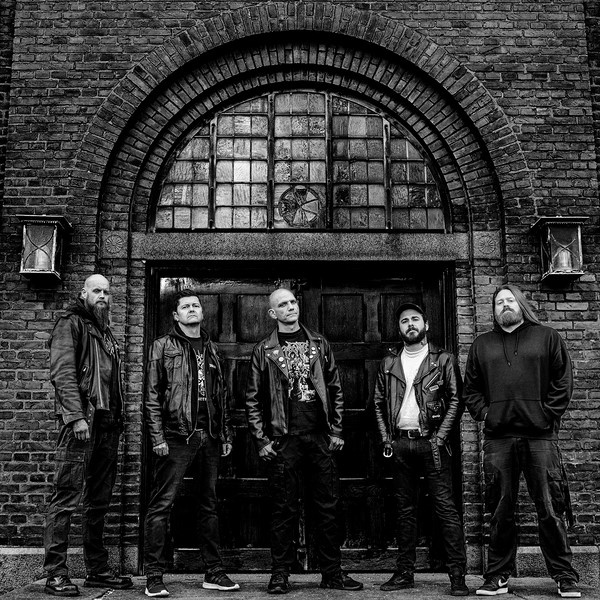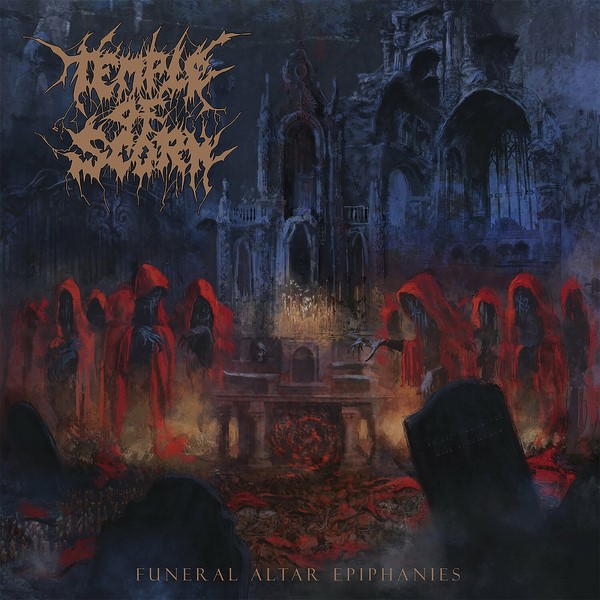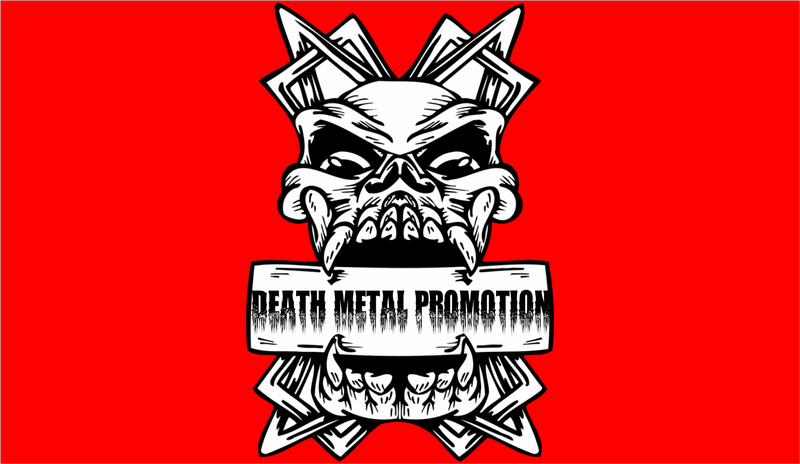 Hi! Your debut album, “Funeral Altar Epiphanies,” has been described as a monumental slab of dark and doomy death metal. Could you delve into the specific inspirations behind the creation of this album?
Hi! Your debut album, “Funeral Altar Epiphanies,” has been described as a monumental slab of dark and doomy death metal. Could you delve into the specific inspirations behind the creation of this album?
Simon (S): Right from the start of the songwriting, it was important for us to differentiate ourselves from all of our other acts. No reason in doing the same thing twice. The original idea for the band was to create dark death metal, inspired by acts which we shared a common like to. Flemming wrote all the music based on this and obviously added his own musical skills and the core of our sound grew with the process, resulting in the album.
As members with backgrounds in various Danish metal bands, how does Temple of Scorn differentiate itself from your other projects, both musically and thematically?
Flemming (F): From a musical point of view, we are striving towards a much more old school, and in some way more simple, approach to making music. When I (Flemming) create music for one of my other bands The Arcane Order, it is a very long and tiring process where everything is weighed and considered again and again. And it takes years to create an album. With TOS it’s much more simple. We make a riff and most of the time BANG it’s a keeper! It’s a very liberating way of working with music. Also it’s very nice to not have to think too much about whether people find this music “original”, “new” or what not. We just create the music we feel like and try not to think too much about it, and it seems to work for us.
The title of your album, “Funeral Altar Epiphanies,” suggests a deep exploration of mortality and transcendence. Can you expand on the specific themes explored in the album and how they manifest in your music?
S: The title of the album was chosen, because it perfectly represents the content and themes combined. Although each song has a different theme, they are all entwined in the same greater scheme. Several keywords are recurring, such as loss, grief, despair, despondency, the rise and fall of grandeur and demise to name a few. Not intentionally to begin with, but as the writing of the lyrics progressed, the same negative and absorbing feel became more and more evident, as a common denominator. Obviously the lyrics reflect our music and from the beginning, Flemming and I have been in sync as to how we wish it to be represented.
Occultism often plays a significant role in metal music. How does Temple of Scorn incorporate occult themes into your music, both lyrically and musically, and what sets your approach apart?
S: And this is also the fact with Temple of Scorn. Occultism plays an important role within the genre and helps to describe and elaborate certain atmospheres and messages in our case. Musically by invoking an ominous and brooding atmosphere, which evokes a dark transcendence. Lyrically to enter a world beyond our three dimensions. By adding elements of both religious and occult content, while referring to the symbols of life and death, you access what lies beyond and paint a scenario of horror and grandeur.
Denmark has a rich history in metal. How has the local scene influenced Temple of Scorn’s sound and approach to music?
F: None at all to be honest. The Danish scene is thriving and evolving all the time, but only very few bands play that old school style that we love. So we mainly looked outside of our borders for inspiration and especially Finland and the US.
With members involved in other projects like Horned Almighty and Volbeat (Flemming), how do these additional commitments impact Temple of Scorn, and how do you manage the balance between different musical endeavors?
F: Well it obviously takes some calendar management skills to make it work. Svend is very busy with Baest all the time, so are using the producer of the album, Quentin, as stand in on guitar from time to time, just to be able to play as many shows as possible. We all were/are in other bands before we started Temple of Scorn, so TOS was never meant to be a main priority. That being said, we all enjoy the band and playing together, so we are doing the best we can to fit TOS into our already very busy calendars.
Could you share the story behind the album’s artwork?
S: The cover depicts our (and the artists obviously) vision of how funeral altar epiphanies would appear. The altar represents the sacrifices made in life and when facing your demise, you are to witness various epiphanies, here represented by the cloaked figures. We choose a dark and gloomy approach, visualizing demise and decay, which also is rather suitable for our musical approach. Khaos Dictator did an excellent job, tapping into our thoughts and ideas.
What were some of the specific challenges you faced during the recording process of your debut album, and how did you navigate through them?
F: Honestly we didn’t really have any. Everything went smoothly and relatively fast. We recorded the instruments at home and only the vocals and drums were recorded in a studio. Or actually our rehearsal room. I’d say the biggest challenge was in the part thereafter – waiting for the album to be released and having to wait 6 months additionally for the vinyl to come out after the CD was originally released. That kinda sucks, but there was a huge delay in vinyl manufacturing after Covid, so it is what it is. Next time it will be more planned and better.
As a band deeply rooted in death and doom metal, how do you perceive the current evolution of these genres in today’s music landscape?
S: The death metal scene hasn’t been this interesting since the nineties and it is great to be a part of how it keeps evolving and expanding at the moment. The noughties were stale, but saw the rise (and exploitation) of the new wave of Swedish death metal. Perhaps due to this, death metal once again became important and inspired a whole new generation and saw the rise of an abundance of great acts. Modern technology has made it alot easier to record and release albums and there are a hell of a lot of bands out there, thirsty for being acknowledged. There are up and downsides to this obviously, but hopefully the strong and talented will remain and keep the flame burning.
What role do live performances play in conveying the essence of Temple of Scorn’s music, and how do you translate your studio sound into a live experience?
S: Since we all are experienced live musicians, it was always meant to be an active live band, not just a studio project. We enjoy performing, since we do not meet up as often as with our own bands and don’t see each other everyday. On stage we convert our sound into a dark mass of energy and try to elevate both ourselves and the audience. Hopefully this results in a transcending experience and a higher level of musical perception.
How do you approach crafting lyrics for Temple of Scorn? Do you draw from personal experiences, literature, or other sources of inspiration?
S: Sometimes from a certain approach, which I then descend into and the lyrics evolve as the writing proceeds. I also find inspiration in reading other bands’ lyrics, which I visualize and then find another approach. Words inspire me and often I stumble upon a word or a sentence that I have to work with and then create lyrics which include them. When I have enough material, I combine the words and sentences which match the title or theme and convert them into text material suitable for the temple…
Are there any specific bands or artists that have had a significant influence on Temple of Scorn’s musical style, and how do you integrate these influences into your own sound?
F: From a musical point of view it’s bands like Desolate Shrine, Abhorrence, old Morbid Angel, Corpsessed, Cruciamentum, Grave Miasma, Mortiferum, Immolation and a lot other bands. I’d say that for the debut, the old Finnish scene has been the biggest influence on the music. Being a huge fan of the old school Death Metal, and also having played it for many years, it just felt natural to melt everything together into one pig pot that eventually became the record.
With “Funeral Altar Epiphanies” marking your debut album, what do you hope listeners take away from the experience of listening to it?
S: A bleak and dark experience most of all, where they for a moment felt utter misery and doom coming out of their speakers. With time, the album will open up and you will be able to delve into the songs and their messages individually. It is worth the effort!
What’s next for Temple of Scorn? Thank you for your time!
F: We are currently playing shows to support the debut album, and we will start creating songs for the next album very soon, so hopefully it won’t be too long until the next slap of dark Death Metal is ready to haunt you all!
https://www.facebook.com/templeofscorn/
https://www.instagram.com/templeofscorn/
https://templeofscorndm.bandcamp.com/album/funeral-altar-epiphanies
https://templeofscorn.bandcamp.com/merch
If you really would like to support Antichrist, you can just Share our article.
You can also support Antichrist by sending a couple bucks to cover some webhosting expenses. =>> PayPal



